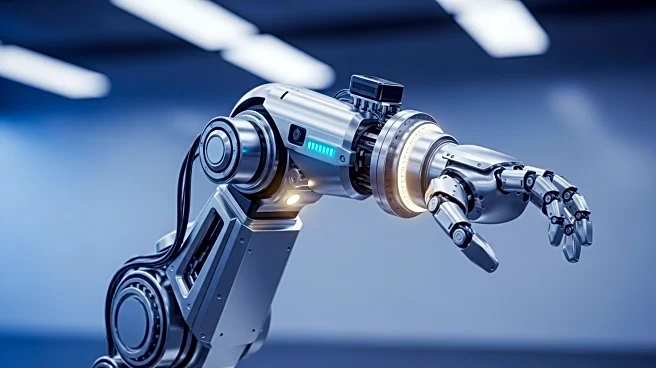What is the story about?
What's Happening?
A recent survey conducted by StudioRed highlights significant trends and challenges in the robotics industry as it approaches 2025. The study involved over 200 robotics product developers and industrial designers, revealing a focus on autonomy, digital twins, and humanoid robots. Robotics development is primarily concentrated in consumer electronics, manufacturing, and biotech sectors. The survey indicates a shift beyond traditional assembly lines, with applications expanding into smart homes, logistics, and life sciences. High-level adaptive autonomy is expected to be achievable within five years, allowing robots to perform tasks without constant human oversight. Digital twins are becoming standard, with many organizations already implementing them. Humanoid robots are anticipated to become highly significant, particularly in logistics and manufacturing. However, the industry faces challenges such as high implementation costs, safety concerns, and ethical issues like job displacement.
Why It's Important?
The findings of the survey underscore the transformative potential of robotics across various industries, promising increased efficiency and innovation. The anticipated growth in humanoid robotics, projected to reach a $38 billion market by 2035, could revolutionize sectors like logistics and manufacturing. However, the high costs and ethical concerns associated with robotics adoption pose significant barriers. Addressing these challenges is crucial for the industry to realize its full potential. Public acceptance will depend on demonstrating tangible benefits, such as improved quality of life and enhanced productivity. The survey highlights the need for strategic investments and policy frameworks to support the integration of robotics into mainstream industries.
What's Next?
The robotics industry is likely to see increased investment in research and development to overcome existing barriers. Companies may focus on reducing costs and enhancing safety measures to facilitate wider adoption. Ethical considerations, such as job displacement, will require attention from policymakers and industry leaders to ensure responsible integration of robotics. As the industry progresses, collaboration between technology developers, businesses, and regulatory bodies will be essential to address these challenges and harness the potential of robotics.
Beyond the Headlines
The ethical implications of robotics, particularly concerning job displacement and accountability, could lead to significant societal shifts. As robots become more autonomous, questions about responsibility for errors and the impact on employment will become increasingly pertinent. The industry must navigate these issues carefully to avoid negative consequences and ensure equitable benefits.
















